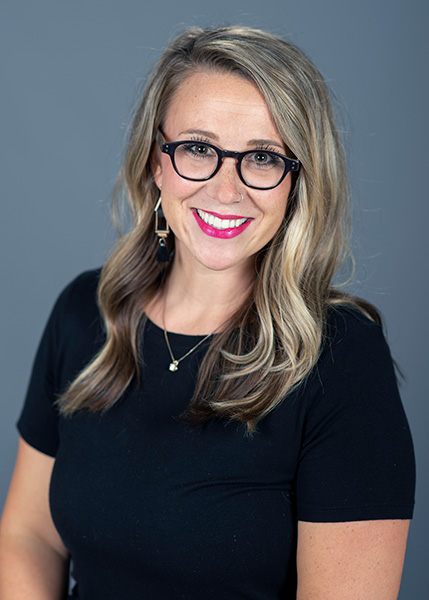- Faculty
- April Perry
April Perry

Contact Information
Email: alperry@wcu.eduPhone: 828.227.3283
Office: 208 Killian Building
Personal Website: https://aprilperry.weebly.com/
Pronouns: she/her/hers
Biography
Dr. April Perry (she/her) is an Associate Professor in the M.Ed. Higher Education Student Affairs program and serves at Department Head/Chair for Human Services at Western Carolina University. Her research is primarily on college student identity development, career development, student transitions, and institutional initiatives for student success. She is the co-editor of the recent book - <i>A Practitioner's Guide to Supporting Graduate and Professional Students</i> (Routledge, 2022).<br><br>As a practitioner, April has worked in Student Leadership Programs, Parent & Family Programs, Fundraising & Marketing, Academic Tutoring Services, Graduate School Administration, and has served in various leadership roles in the academy such as Department Head, Assistant Department Head, Interim Associate Dean of the Grad School, and HESA Graduate Program Director.<br><br>In 2016, April received the WCU Graduate School’s <i>Award for Excellence in Graduate Student Mentoring. </i>In 2017, she was named <i>Outstanding Professional in Graduate and Professional Student Services</i> by NASPA's AGAPSS Knowledge Community. In 2020, she was selected for the Cystic Fibrosis Foundation's Blue Ridge Stand Out (14 under 40). In 2022, she was honored with NASPA AGAPSS’ <i>Outstanding Contribution to Research and the Profession</i> Award, and also in 2022 received<br>NASPA Faculty Council’s <i>Outstanding Support for Graduate Students</i> Award.<br><br>April is passionate about student/human development and lives by the motto that 'the only thing better than watching someone grow is helping them grow.'<br>For more information about April, visit aprilperry.weebly.com
Education
- Ph D, University of Canterbury, Higher Education Student Development
- MAED, University of Central Oklahoma, Adult Education - Training and Development
- BA, University of Central Oklahoma, Communication - Broadcasting
Teaching Interests
<b>Teaching Philosophy and Approach:</b><br>I live by the motto that the only thing better than watching someone grow is helping them grow. This motto reflects my teaching philosophy, and what I believe to be my role as an educator. While the mission of educational institutions is to educate the next generation of citizenry to be the critical conscience of society, I believe it is essential for educators to also prepare students for their futures by equipping them with professional, practical, and personal transferable skills. I also believe that educators have a role in helping students gain a realistic perspective of their employment opportunities, which must start early in a student’s academic pursuits. By helping students better manage their expectations of life-after-college and equipping them with skills to be lifelong learners, they will become more critically engaged in their local communities and the global society. Teaching, training, and facilitating learning environments allow me to fulfill what I believe to be fundamental responsibilities of any educator. Those responsibilities are based on providing learners with an educative and challenging environment where curiosity is awakened, intrinsic motivation and active/collaborative learning (the co-construction of meaning) are evident, and the greater connection comes from critical analysis and reflection on both the students’ personal experiences and the course content.<br>As a learning community (like the HESA program), knowledge acquisition and the co-creation of meaning heavily relies on each person’s attendance and engagement in the course work and discussion. I do not view myself as the “knower” of information who lectures as a “sage on a stage.” Rather, I take on the role of a facilitator, a “guide on the side” that encourages students to pull from their own and others’ lived experience to interpret course materials and co-create meaning. This complements my personal teaching philosophy as well as the HESA Program mission, goals, and outcomes.
Research Interests
<b>Research Interests:</b><br>Student Development (undergrad & graduate)<br>Student Transitions<br>Career Development/Preparation<br>Career Transitions<br>Leadership Development<br>Student Involvement and Engagement<br>Institutional Strategies that promote student success<br>The Role of Higher Education in the 21 <sup>st</sup> Century<br>The Value of a Degree<br>Faculty Transitions<br>Faculty-Student Mentor Relationships<br><br><b>Methodological Alignment:</b><br>April identifies as a Qualitative Researcher and utilizes methods including, but not limited to:<br>Symbolic Interactionism<br>Naturalistic Inquiry<br>Narrativity/Narratology<br>Case Study<br>Ethnography (including auto-ethnography)<br>Phenomenology<br>Action Research<br><br>For a list of publications, presentations, and other scholarly activities, view Dr. April Perry's CV at: https://aprilperry.weebly.com/cvwork-history.html